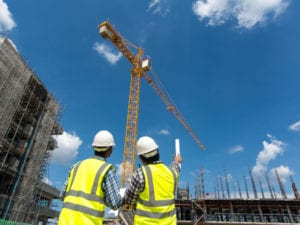The construction industry has potential to create employment opportunities to cushion the impact of an anticipated increase in unemployment in the immediate aftermath of the current nation-wide lockdown.
This is according to a submission made by the Construction COVID-19 Rapid Response Task Team to motivate for a phased reactivation of the construction Sector. The task team is a body representing major organizations in the sector including contractors, property developers, construction professionals, suppliers, and service providers. The submission is calling for an immediate re-activation of construction sites that were at various stages of completion when the lockdown came into effect on the 27th of March, under strict safety requirements. This would be followed by a phased re-opening of the industry at the beginning of May. The Chairperson of the Task Team, Mr John Matthews acknowledged the necessity of the lockdown and the positive impact it had in preventing cases of occupationally acquired infections on construction sites. He also admitted that the lockdown period had provided the industry an opportunity to augment existing health and safety systems in the construction industry in view of the threat posed by the pandemic. ‘It was necessary for the industry to cease all operations at that time and there is no doubt that the decisive action taken by the government contributed significantly towards flattening the curve of new infections. We used this period to adapt health and safety systems to ensure that we safeguard the health of employees on construction sites. We have also identified qualifying construction sites that are ready for immediate re-activation’ said Matthews. He added that the industry had already submitted a detailed COVID-19 Risk and Mitigation Plan to the Department of Public Works and Infrastructure as part of the motivation for a phased re-opening. This includes a requirement for every company that is to be considered for re-opening to present a suitable operational plan to prevent transmission of the infection.On the extended lockdown and its impact on the construction industry, Matthews commented that they were concerned about irrecoverable damage to critical infrastructure projects and possible loss of equipment and material that remains on live construction sites that were at various stages of completion when the nation-wide lockdown came into effect.
‘A continued lack of activity of these projects could mean we do not have any sites to return to when the lockdown is eventually lifted. Hence the call for an immediate re-activation of work on live construction sites and for the resumption of professional planning, costing and design work that supports such work’ said Matthews. Prior to the COVID-19 outbreak, the construction industry faced significant challenges including the lack of work, late and non-payment and uncontrolled illegal construction site invasions that resulted in reported company closures and loss of jobs. The industry is now calling for activation of planned public infrastructure spending as announced in the medium-term expenditure framework (MTEF), for positive knock-on effects on economic recovery and growth through the multiplier effect. This model for economic recovery has been used by many countries emerging out of periods of crisis. Despite bearing some of the highest burden of the pandemic, the governments of the United Kingdom, USA, Australia, New Zealand, Germany, China and Italy have re-opened their construction industries and committed to increased public infrastructure spending as part of their post-pandemic economic recovery plans. About COVID-19 Rapid Response Task Team The Construction COVID-19 Rapid Response Task Team (“CC19RRTT”) is an industry grouping that was convened to charter a recovery plan for the construction sector. It incorporates the entire construction value chain covering suppliers, manufacturers, property developers, built environment professionals and contractors (main contractors and subcontractors). It is made up of Master Builders South Africa (MBSA), Association of South African Quantity Surveyors (ASAQS), Western Cape Property Development Forum (WCPDF), South African Institute of Architects (SAIA), Black Business Council in the Built Environment (BBCBE), Consulting Engineers of South Africa (CESA), Association of Construction Project Managers (ACPM), South African Institution of Civil Engineering (SAICE), South African Black Technical and Allied Careers Organisation (SABTACO), South African Women in Construction (SAWIC), The Concrete Institute of South Africa (TCI), Cox Yeats Attorneys and Master Builders KwaZulu-Natal (MBA KZN) as the convener.






